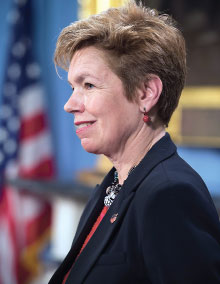Former Army Psychiatrist Is Ready to Run New York City From the Top
Abstract
Loree Sutton, M.D., a retired brigadier general, thinks that New Yorkers are ready for a leader who can rally the troops and bring people together.

Loree Sutton, M.D., says that if she is elected mayor of New York City, she will work to ensure that city residents with mental illness receive the best treatment available and not end up in shelters, the criminal justice system, or emergency departments.
Last November, psychiatrist Loree Sutton, M.D., tossed her hat into the ring to run for mayor of New York City, saying she believed that New Yorkers are ready for change. It’s a logical next step for Sutton, who worked her way up through the Army’s Medical Corps and then became an advocate for the Big Apple’s veterans after she left the service.
Sutton was an independent during her military career but recently switched her registration to the Democratic party. She worked as a surrogate to veterans for Hillary Clinton in 2016 and characterizes her political position now as “center left.”
A California native, Sutton earned an undergraduate degree in business before entering medical school at Loma Linda University. She joined the Army for her residency training, during which time she spent a month with APA’s Government Relations team in Washington, D.C. There she learned how the political process informs medical policies at every level. Her later Army assignments included work as division psychiatrist with the 1st Armored Division in Germany and deployments to Iraq and Kuwait during the 1991 Persian Gulf War. Her last post before retiring as a brigadier general in 2011 was as founding director of the Defense Centers of Excellence for Psychological Health and Traumatic Brain Injury.
After a brief stop in New Mexico, Sutton moved to New York, where Mayor Bill de Blasio appointed her head of the Mayor’s Office of Veterans’ Affairs in 2014 (Psychiatric News). There, she developed a comprehensive program of holistic community services to address matters facing veterans. The office united health, legal, educational, employment, and housing services for veterans under the rubric of Vet Connect NYC.
To make the system accessible, the office developed a peer-to-peer program to bring vets into health care but also to connect them with arts and other social-bonding opportunities. Staff teamed up with the VA and the Headstrong Project at Weill Cornell Medical Center, which has an integrative approach to trauma treatment that is free to veterans and their families. Among other accomplishments, homelessness among the city’s veterans was reduced by 90%, she said.
“That showed that we could take on the toughest challenges and scale them up to a larger population,” she said. “We could do that with every other domain challenging New York City.”
During her tenure, her office expanded from four to 44 employees and became a full-fledged city agency, the Department of Veterans’ Services. She left that post last October to run for mayor.
As mayor, she said, she would work to make sure that all New Yorkers with mental illness receive the best treatment available to avoid ending up in shelters, the criminal justice system, or emergency departments.
The election may be 21 months away, but other candidates—most with prior elective experience—have already announced. Sutton said she is spending time now immersing herself in policy issues. (De Blasio is restricted by term limits from running again.) Her 30 years of leadership experience in the Army serve as a foundation for her campaign.
“New Yorkers are ready for a different kind of leader, one who can bring people together and craft creative solutions to the problems facing the city,” she said. “In the Army, you have to listen to voices from across the spectrum. [Leaders] have to identify the values that inform a particular approach and what are the expected outcomes—and then be held accountable.”
Her background as a psychiatrist and general officer provides crucial assets she can use to serve the city at a time when it needs a systems-level approach to implementing big ideas.
“I believe I bring a relational orientation to everything I do,” she said. “I look for ways to bring people together, to bridge differences, and to craft creative solutions.” ■



